The Class of 2024 sets their sights on the future
A new cohort of seniors charts a path to AI fluency, financial
stability, and work-life balance
Jump to section
As they enter their final year of college, the class of 2024 is
focused on setting themselves up for success in an uncertain,
fast-changing economy. Our latest survey shows three key goals are top
of mind for this year’s seniors.
Adapting to the rise of generative AI
The vast majority of 2024 graduates are familiar with tools like
ChatGPT and DALL-E, and 50% plan to build new skills in light of the
emergence of generative AI. A third of this year’s seniors—and more
than half of tech majors—say they plan to use generative AI in their
career.
Charting a path to financial security
More than half of this year’s graduates expect to carry student loan
debt, and of those, almost 70% say their debt will influence the
jobs they consider upon graduation. Additionally, almost a third
plan to do gig or freelance work on top of their full-time job,
often because they believe they’ll need the extra income.
Finding a sustainable balance between work and life
COVID-19 and economic instability have taken a toll on this year’s
seniors. Eighty percent of the class of 2024 have felt burned out as
undergrads, and many are worried about burnout in their careers. Not
surprisingly, a majority say it’s deeply important that their future
employer offer work-life balance and mental health support.
The class of 2024
by the numbers
77%
are more likely to apply to a company that offers job stability
77%
are more likely to accept a job at a company with a diverse
leadership team
69%
are more likely to apply to a job with a flexible schedule
41%
are more likely to apply to a hybrid job; 22% are more likely to
apply to a fully remote job
33%
spent their summer pursuing an internship; 37% had a part-time
job, and 27% worked full-time
Jump to section

Generative AI
Generative AI
sparks apprehension, excitement, and action
sparks apprehension, excitement, and action
Awareness of generative AI has increased rapidly over the last few
months, and the majority of 2024 grads are now familiar with tools
like ChatGPT and DALL-E. This class remains split on the impact of
these tools, with roughly equal shares saying they’re concerned vs.
unconcerned about how generative AI will affect their careers. One
thing is clear, though—worried or not, this year’s seniors are
already thinking about how they’ll adapt to an AI-enabled future,
from building new skills to seeking out opportunities to use
generative AI tools in their first job.
Sentiment about generative AI is solidifying, but remains split
Eighty-five percent of this year’s seniors have heard of tools like
ChatGPT and DALL-E, up from just 61% of 2023 graduates who were
familiar with these tools just a few months ago. Similar to the
class of 2023, the class of 2024 is evenly divided between positive
and negative feelings about generative AI—but they are more likely
to have made up their mind about the impact they expect these tools
to have. Only 8% of 2024 graduates feel unsure about how generative
AI will affect their careers, compared to 16% of the class of 2023
last spring.

Some students are less likely to be exposed to generative AI
While 91% of students attending institutions with “selective”
admission standards are familiar with AI tools, the same is true for
only 79% of students at schools with “inclusive” standards. There is
also a significant gender gap in familiarity with generative AI; 94%
of men are familiar with AI tools, compared to 79% of women. This
gap exists even among tech majors, who are more likely to be
familiar with generative AI overall. And among tech students who are
aware of these tools, women are more likely to worry about how they
will impact their careers—53% of women are “somewhat” or “highly”
worried, compared to 41% of men.
Have you heard of generative AI tools such as ChatGPT and DALL-E?
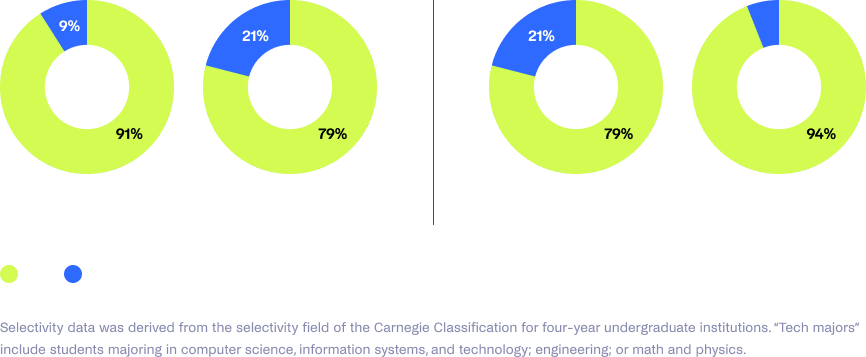
Many 2024 grads are eager to put generative AI to work
Of 2024 graduates who are familiar with generative AI tools, about 1
in 3 plan to use these tools in their career, and 1 in 5 would be
more likely to take a job where they have a chance to experiment
with generative AI.
These numbers are highest for students majoring in tech fields such
as computer science, data analysis, and engineering. However, a
significant share of students in non-tech fields
rated as highly exposed to generative AI automation—including business and the humanities—also plan to
use AI in their
careers.
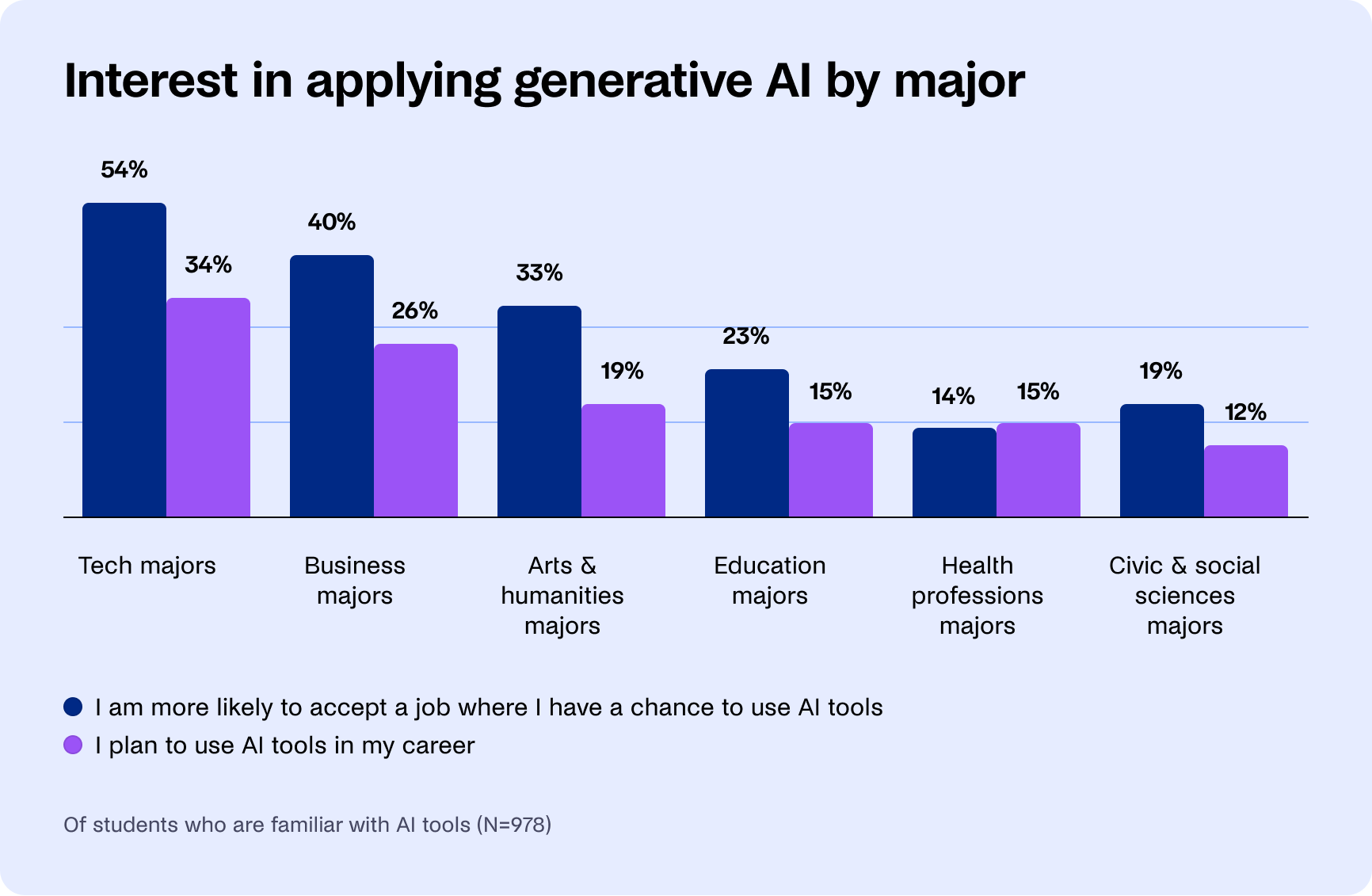
The Class of 2024 is motivated to adapt to an AI-enabled workplace
Half of 2024 graduates, including 64% of tech majors and 45% of
non-tech majors, say they plan to develop new skills in light of the
emergence of generative AI. Notably, students who are worried about
the impact of generative AI on their careers are even more likely to
plan on upskilling to adapt.
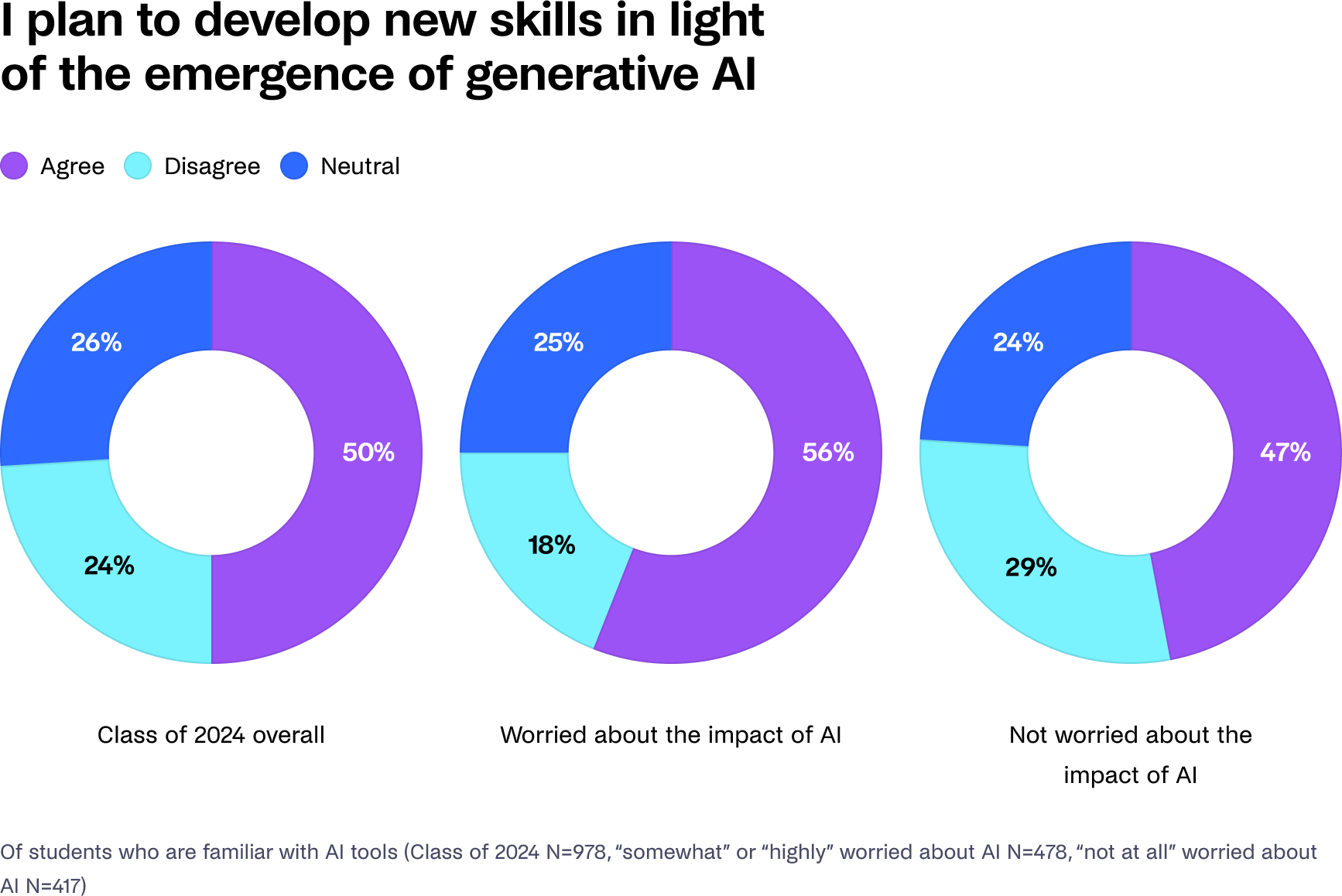
Employer support for upskilling is on the rise
With technology changing faster than ever, employers are recognizing
the importance of helping new grads upskill on the job. The share of
job descriptions mentioning professional development support (e.g.,
learning stipends) has more than doubled on Handshake in recent
years, and almost 50% of 2024 graduates say they’re more likely to
apply to a company that provides employer-sponsored upskilling
resources.
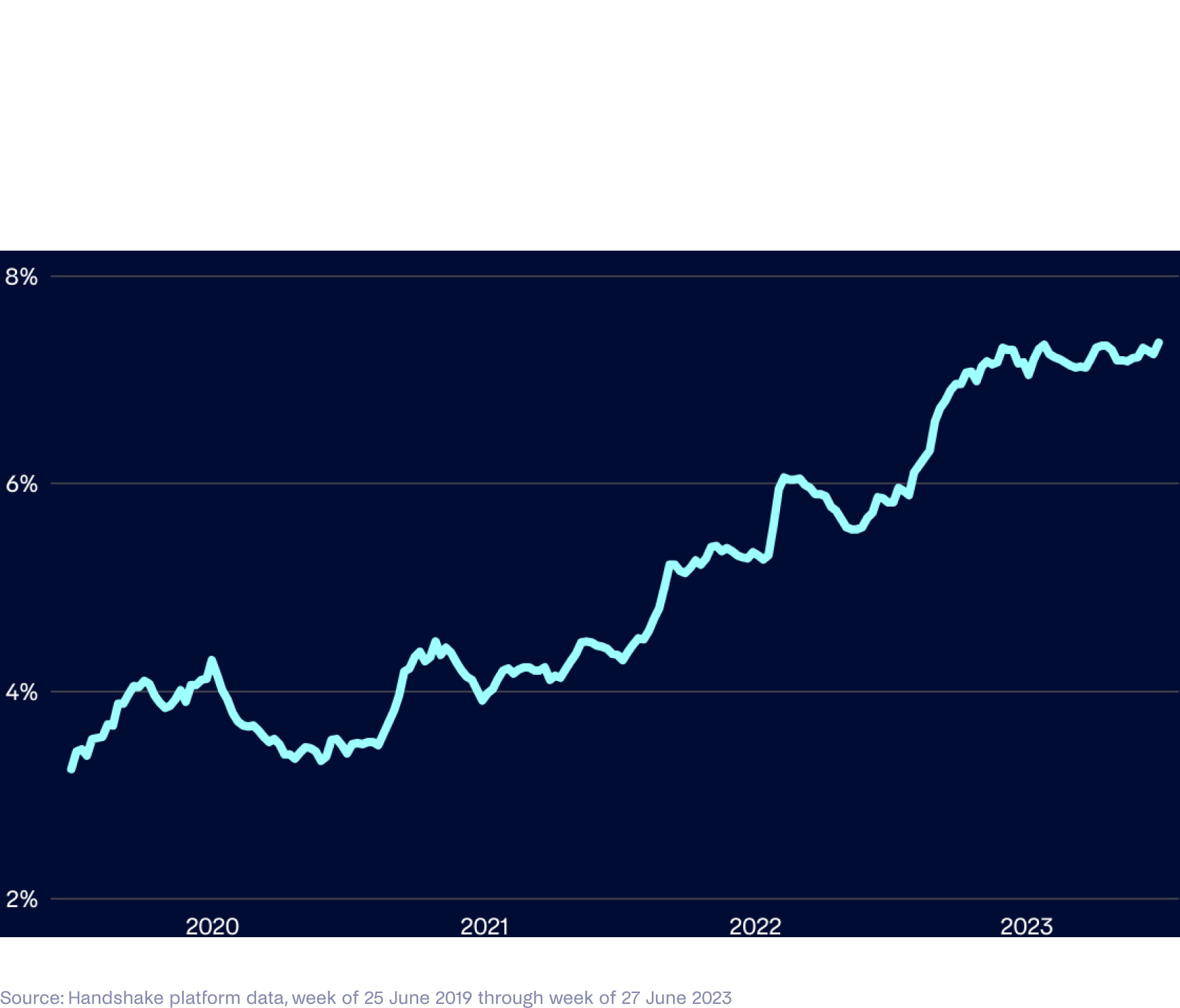
Jump to section

Financial security
Financial security
is top of mind
is top of mind
The Class of 2024 is carrying formidable student loan debt, and
almost half say the current economic news makes them feel
pessimistic about their job search and future career. So it’s no
surprise they’re anxious about their financial future. We dug into
how that sentiment is influencing their decisions around which jobs
to consider, whether to take on additional gig or freelance work,
and how to approach negotiating their salary.
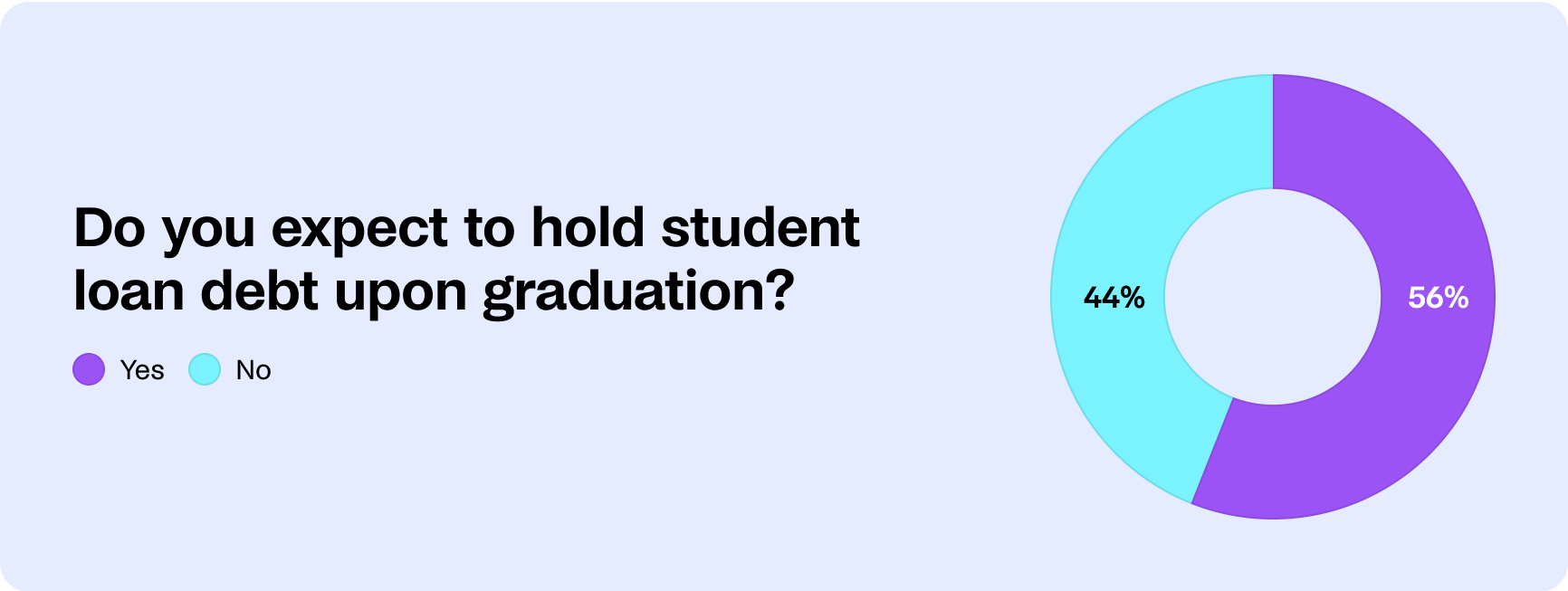
“I will have to rule out certain jobs in industries that won't pay
me enough to pay back my student loan debt and afford to live.”
Class of 2024 student
Student loans loom large for this year’s seniors
Unsurprisingly, more than half of 2024 grads anticipate holding
student loan debt, which has a real impact on their career
trajectories. Of students who expect to carry debt, almost 70% say
it will influence the jobs they consider upon graduation. Debt can
be a particularly significant burden for women and Black students,
as well as first-generation college students, who are more likely to
need to take out loans to finance their education.
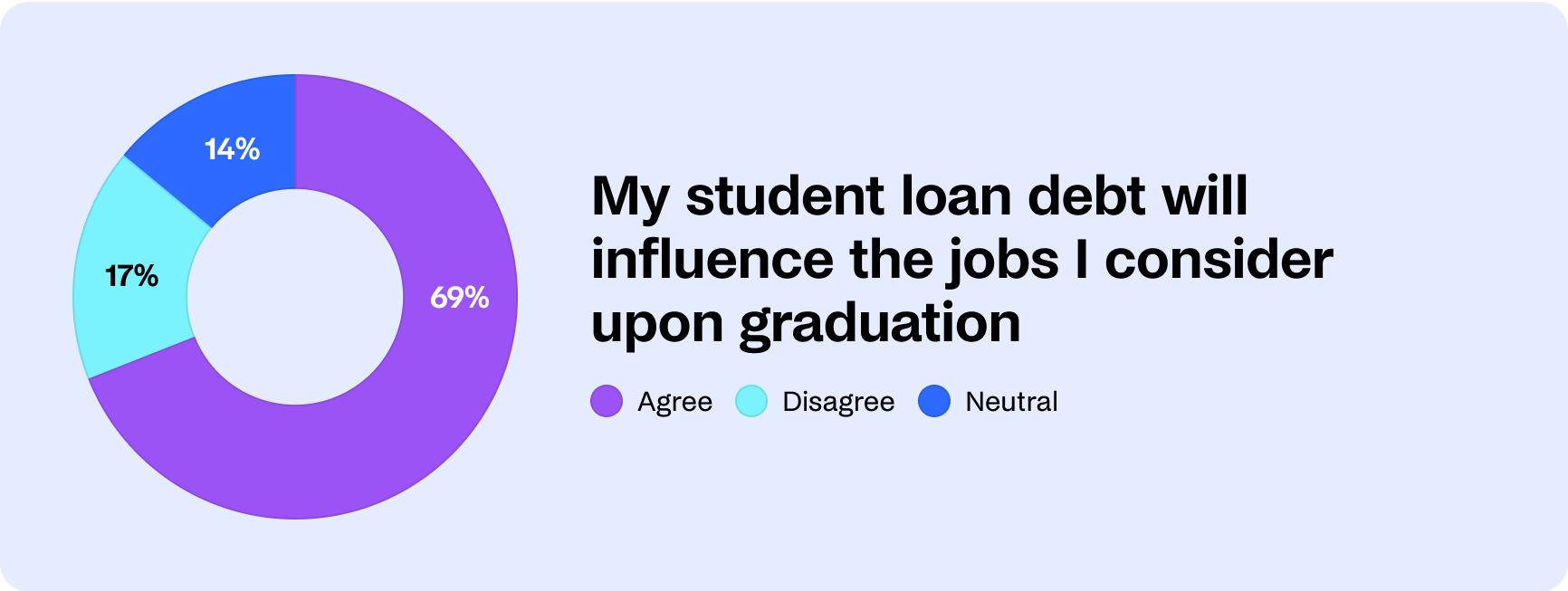
“As much as I would love to choose a job based on passion and work
life balance, I do not think that will be possible due to loans and
finances.”
Class of 2024 student
Student loan assistance is emerging as a standout employer benefit
The share of job descriptions on Handshake mentioning student loan
repayment programs has more than doubled since 2019, as companies
look for ways to distinguish themselves with top talent and relieve
the pressure student loans place on early-career hires.
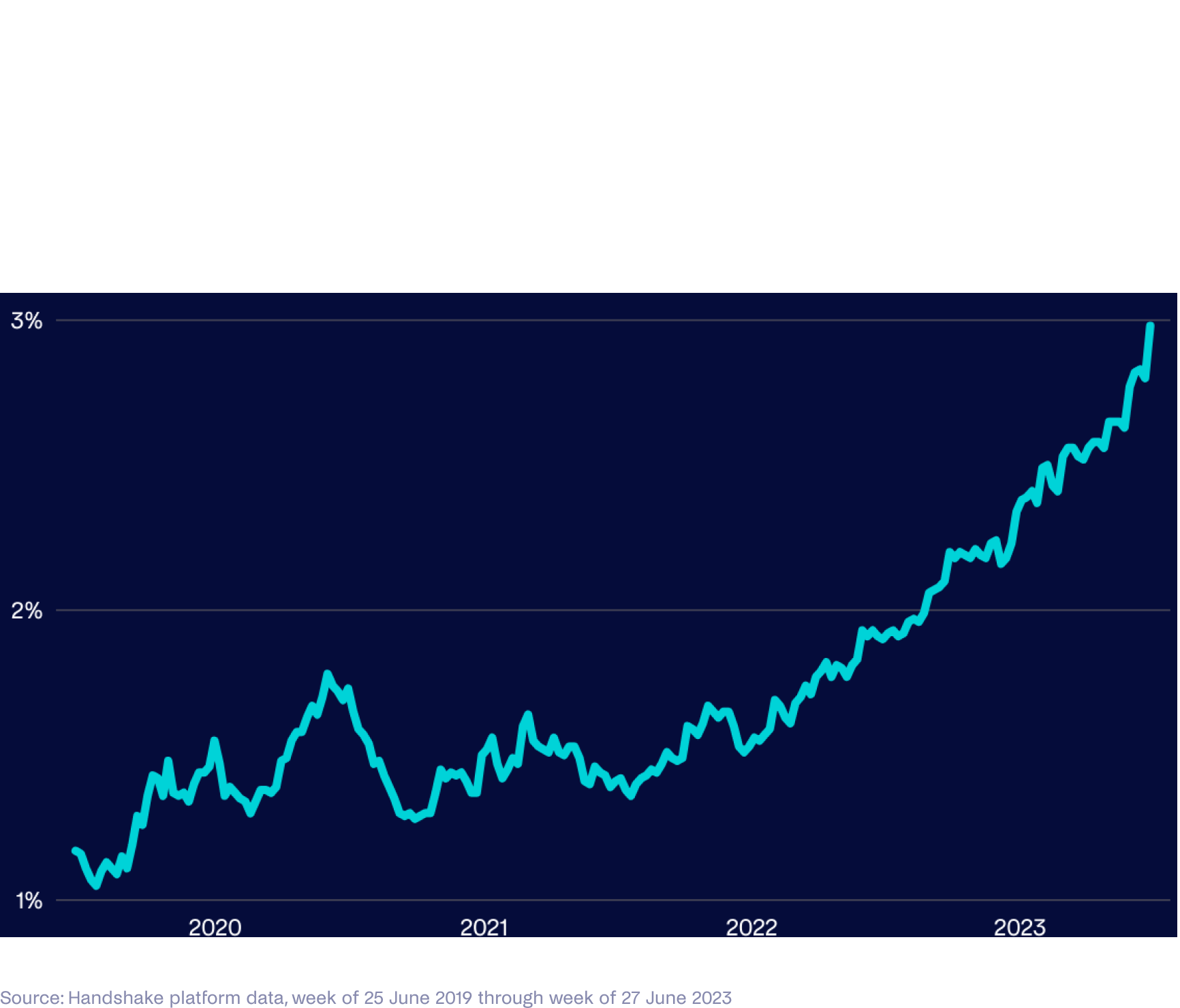
Many students plan to pursue gig work to make ends meet
More than 40% of this year’s seniors expect to pursue gig or freelance
work after graduation, with almost a third saying they’ll do this work
on top of a full-time job. And 70% of students say having the
flexibility to pursue side gigs is important to them, regardless of
whether they plan to do so right away.
Motives for taking on gig work vary, but the decision most often comes
down to finances. Of students in our study who shared specific reasons
for pursuing gigs and freelance projects, about 45% mentioned motives
related to income, debt, and expenses. Students who said their student
loan debt would influence their job choices were more likely to plan
on pursuing gig work in addition to a full-time job.
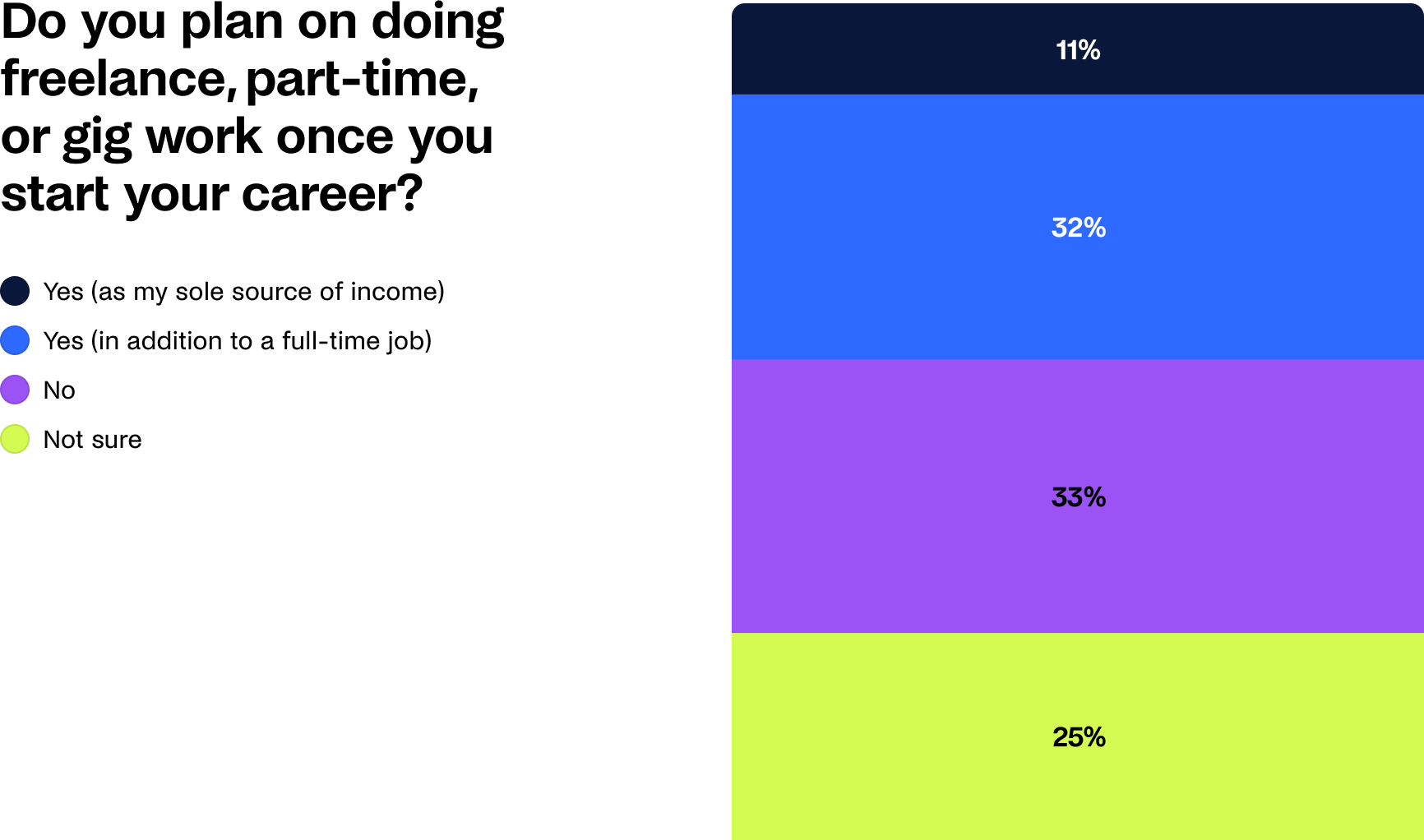
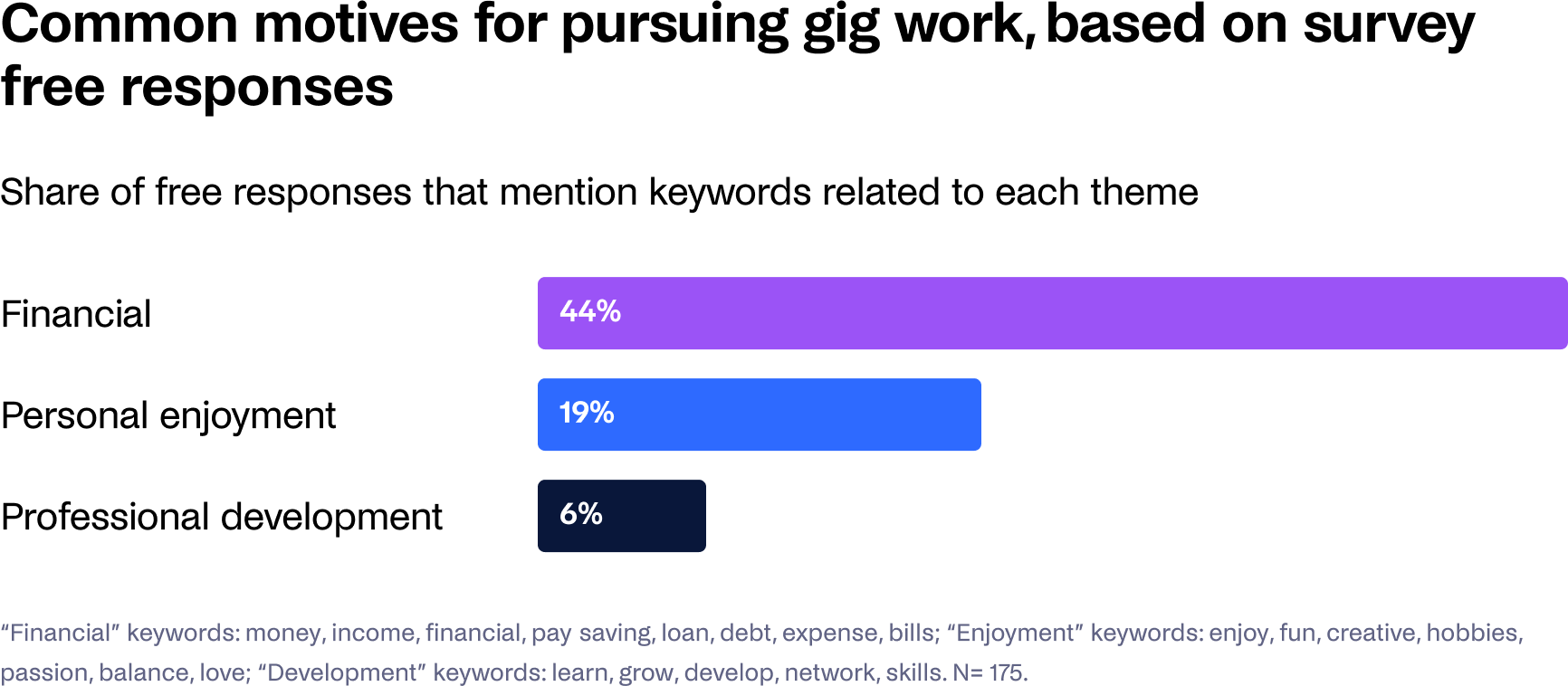
Salary matters, but
negotiation feels risky
negotiation feels risky
Seventy percent of 2024 graduates would be more likely to apply to a
job with a high starting salary. But when it comes to negotiating an
offer, this year’s seniors are hesitant—only 24% say they definitely
plan to negotiate their salary. The most common reason for not
negotiating is fear of an employer rescinding a job offer, closely
followed by concern about making a bad impression.
Women are less likely to believe negotiating is worth the risk
Women in the Class of 2024 are significantly less likely than men to
plan on negotiating their salary. They’re also more likely to say
their reasons for not negotiating are related to fear of negative
consequences or uncertainty about how to negotiate successfully.
Only about a third of women are confident they can negotiate the
highest salary possible at a job they’re qualified for, compared to
almost half of men. Sadly, these concerns are often justified.
Research shows women are less likely to get what they ask for when
they negotiate, and more likely to receive negative feedback, such
as being labeled “bossy” or “aggressive.”
“As a Latina-Asian woman with piercings, I feel that my requests for
negotiation may be compromised by superficial judgement of my
appearance, especially in an industry dominated by white men.”
Class of 2024 student
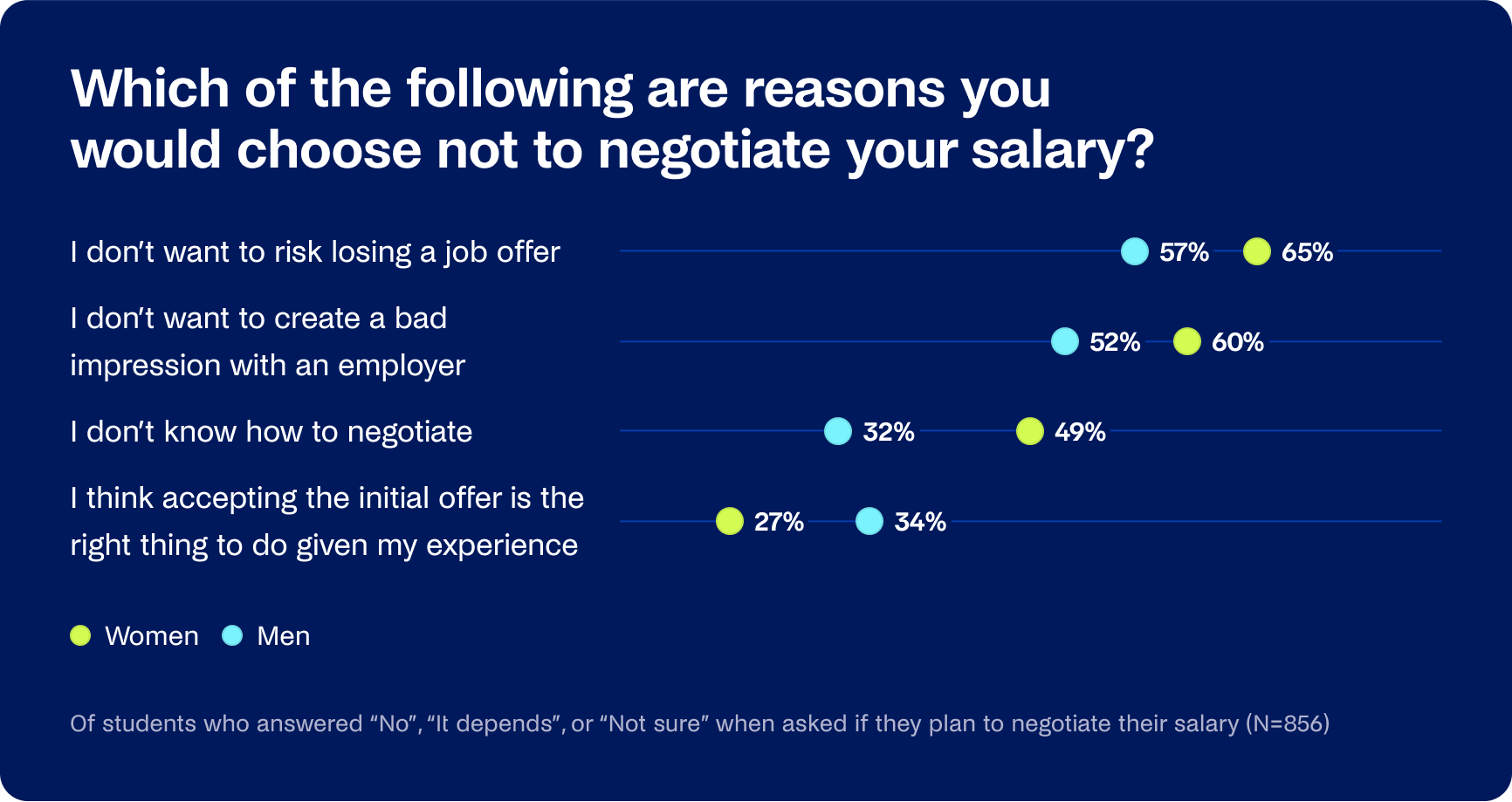
Jump to section

Work-life balance
Work-life balance
is a priority in
uncertain times
is a priority in
uncertain times
This year’s graduates are no strangers to stress. They weathered
profound anxiety and isolation during COVID-19, and they’re entering
the job market at a moment of economic uncertainty. As they take the
first steps in their careers, they’re looking for employers who will
support their well-being and help them find a sustainable balance
between work and life.
Feelings of burnout are common among this year’s seniors
More than 80% of 2024 graduates have experienced symptoms of
burnout—such as persistent exhaustion, lack of motivation, and
unusual negativity or cynicism—at some point during their
undergraduate career. A similar share are worried about experiencing
burnout once they enter the workplace, and about 25% say this is a
major concern.
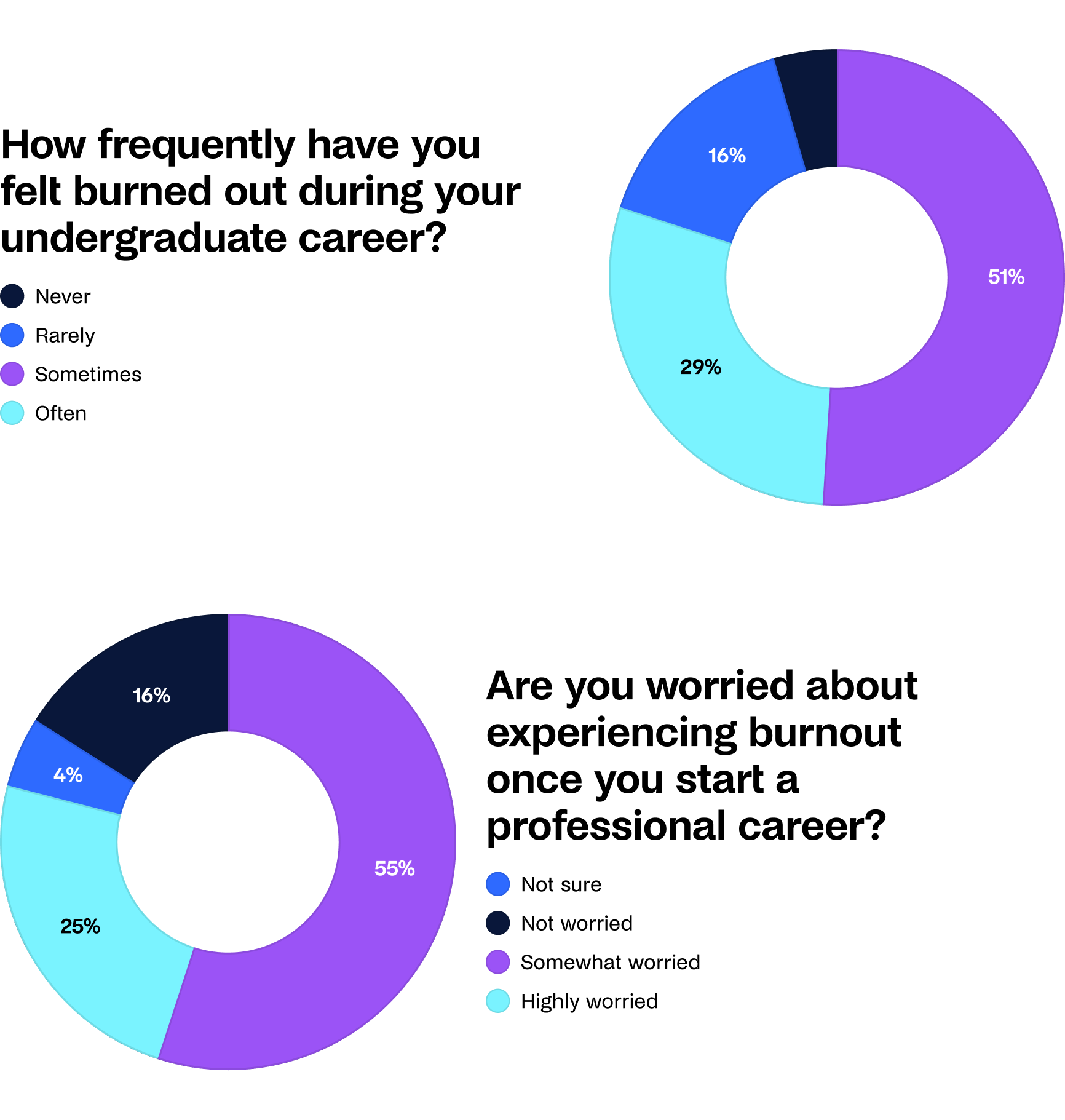
The Class of 2024 places a premium on work-life benefits
An overwhelming majority of this year’s seniors say it’s important
that their employer offer work-life balance resources and time off
for mental health. And while the flexibility to work remotely or set
their own hours isn’t critical for most 2024 graduates, 67% say it’s
“very important” that they have flexibility to step away from work
to deal with major life events and personal responsibilities.
Work-life balance benefits matter to students even if they aren’t
personally concerned about burnout. Of 2024 graduates who are “not at
all” worried about experiencing burnout in their career, a majority
still say it’s very important that their employer offer support to
help them effectively balance work and life demands.
Employers are stepping up to support mental health
More than 15% of job descriptions on Handshake now mention keywords
related to mental health, employee well-being, and work-life
balance—a dramatic increase from about 6% in early 2019.
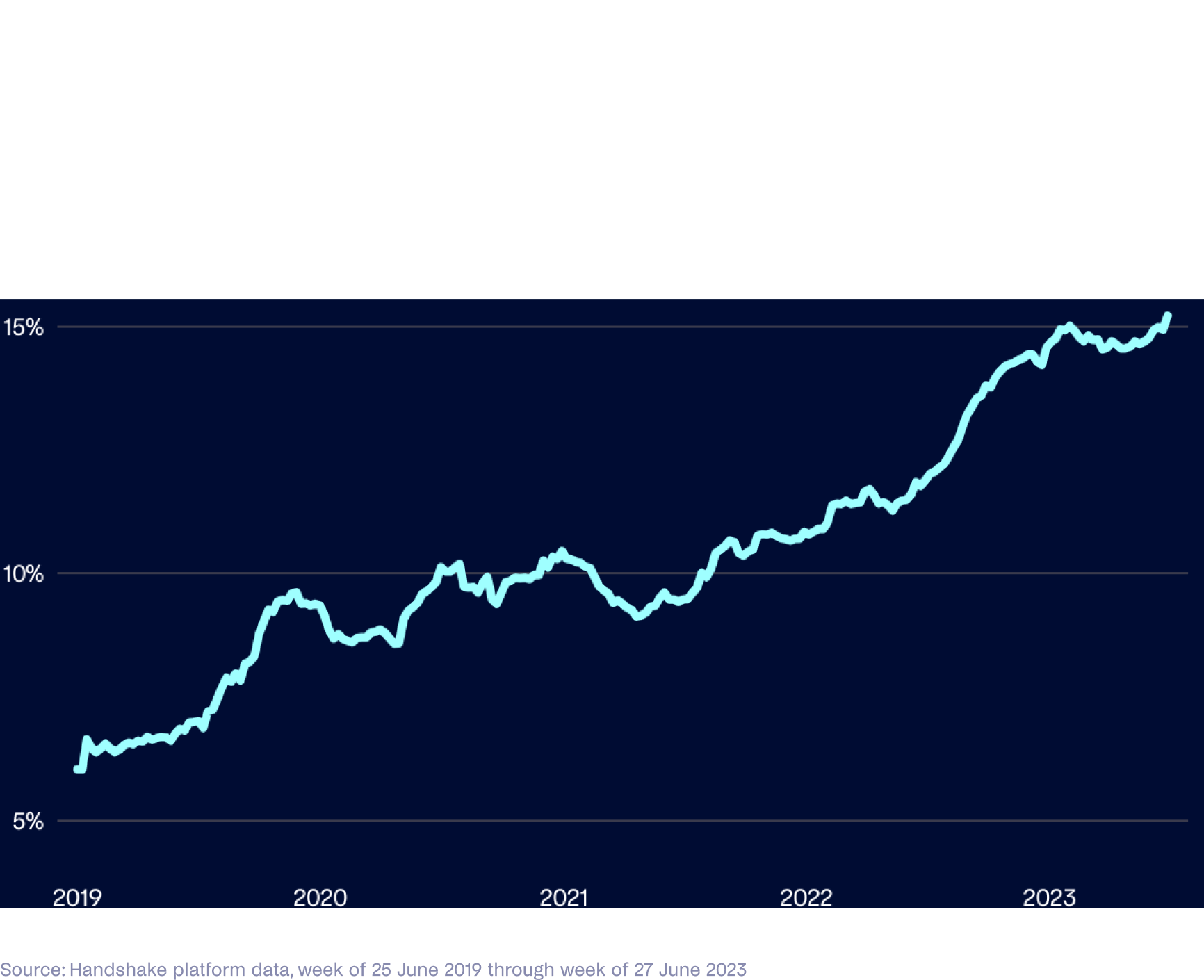
Jump to section

Conclusion
The future workforce is ready to take charge
The Class of 2024 is gearing up for graduation on their own terms.
They’re putting themselves first and focusing on their personal and
financial well-being as they look to launch their careers. They’re
acutely aware of the rise of generative AI, and determined to learn
how to use it. In short, this year’s seniors are taking charge of
their next chapter, shaping the future of work for themselves—and
the rest of us—in the process.
Jump to section
Methodology
Student sentiment surveys
Between June 26–July 12, 2023, Handshake randomly invited students
across the platform to participate in an online survey. After
cleaning, 1,148 Class of 2024 students pursuing bachelor’s degrees
from 440 institutions completed the survey.
Survey weighting
In order to provide a more representative snapshot of student
sentiment across four-year college students in the US, survey
responses were weighted by gender, race and ethnicity, and
selectivity using institutional enrollment numbers from federal NCES
datasets.
Selectivity
Selectivity data was derived from the selectivity field of the
Carnegie Classification for four-year undergraduate institutions.
Selective institutions were those that were classified as
“selective” and “more selective” (40th percentile or above among all
baccalaureate institutions based on admissions), while Inclusive
institutions included those defined by Carnegie as “inclusive” as
well as those not classified.
Job description data
To determine change in the share of jobs mentioning professional
development support, student loan assistance, and mental health
benefits, Handshake analyzed full-time job descriptions that were
active on a given week on the Handshake network between 1/1/2019 to
6/27/23. A job was flagged as relevant if the description contained
any of the unique keywords related to the topic of interest. For the
mental health topic, job roles and industries explicitly dealing
with mental health were excluded from the analysis.